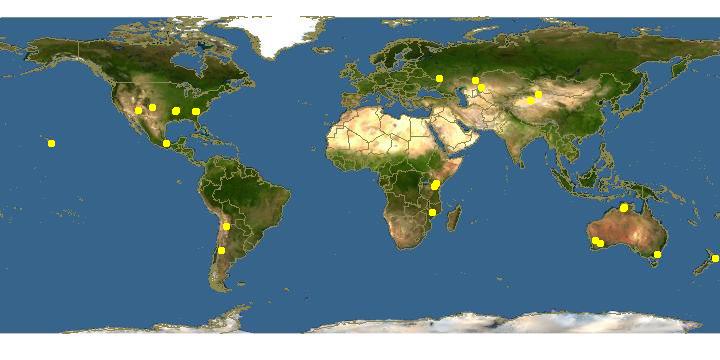
Click on map for details about points.
|
|
Overview | |
Growth and sporulation occur on maltose-yeast extract agar at pH 5.1-5.8 in company with the previously mentioned Malaya-82 bacterium as the food organism. Growth also occurs on oak bark agar. Sporocarps 80-185 Ám tall; subsporangial stalk segment present and articulating with main part of stalk. Typically, there is a stalk segment just beneath the sporangium that articulates with the remainder of the stalk by means of a joint-like arrangement. Sporangia globose or oblong; (1-) 2-4 (8-)-spored; spores globose to subglobose or tetrahedral, 5-7.5 x 6.3-10 Ám, each giving rise to 2 flagellate cells immediately after germination; 11.3-27 x 13.8-35. Spores are uninucleate and nondeciduous. Spores germinate into a single uninuceate flagellate cell. The flagella usually occur in pairs (1 long and 1 short). Protoplasts are typical of the genus most have 1 or a few nuclei, but up to 21 nuclei have been observed within a single protoplast. None of the protoplasts return to the flagellate stage when placed in water. The vermiform stage has been observed, but is less common than in other members of the genus. Prespore cells are usually uninucleate. Cysts contain 1-5 nuclei, globose to oval or occasionally irregular.
|
|
|
Links to other sites | |
|
|
|
Acknowledgements | |
The Eumycetozoan Project -- working to understand the ecology, sytematics and evolution of myxomycetes, dictostelids and protostelids -- the true slime molds.
Sponsored by grants from the National Science Foundation.
|
|
|
Feedback |
Please send any corrections and comments about this page to John Shadwick
Department of Biological Sciences, University of Arkansas, Fayetteville, AR 72701, USA
email: jshadwi@uark.edu
phone: USA-479-575-7393.
|
|
| Supported by | |
Updated: 2024-04-19 13:07:40 gmt
|